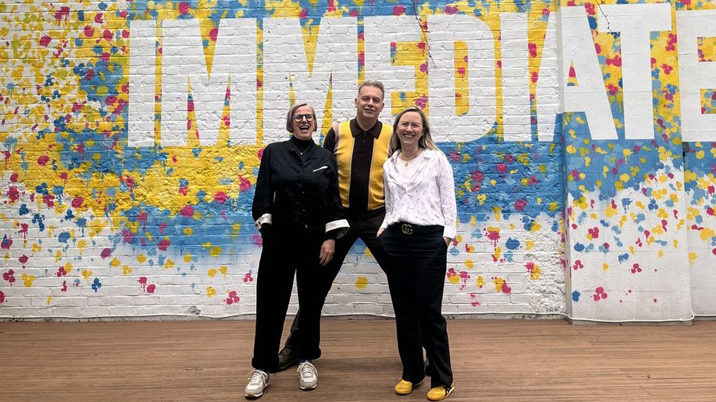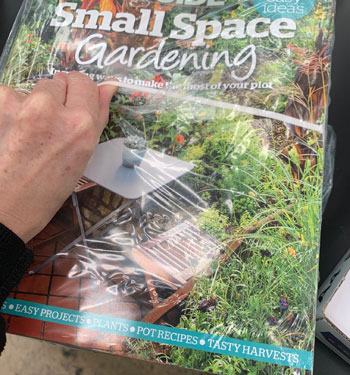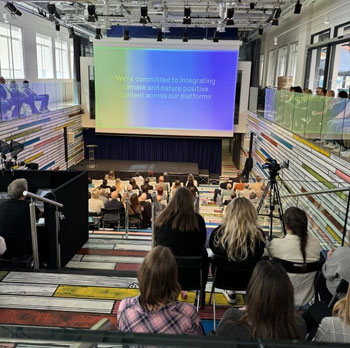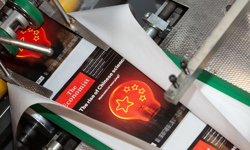
At Immediate, we’ve been working to reduce our environmental impacts for some time now. There have been lots of learnings around the technicalities of carbon footprints and calculations, different scopes and boundaries. But one of the most important things we’ve learned is how to use our networks, effective communication and collaboration to help us to get to where we need to be – and how to help others as well. It’s not, as they say, rocket science, but it has certainly supercharged our journey towards net zero.
Working with suppliers
‘Engage with your supply chain’ is the advice given to every company which locates most of its emissions in scope 3 – that is, in the activities that happen upstream and downstream within the value chain. This slightly abstract advice can feel frustrating; but we have found that gentle persistence and building relationships will bear fruit.

A series of visits to different warehouses along the distribution journey of our magazines revealed examples of plastic packaging which can be removed now without causing any reduction in quality. And it’s given us plenty of food for thought about longer term changes that we might be able to make. Meanwhile, we have fostered useful relationships with our partners and found out about recycling and charity initiatives which are already in place.
We’re absolutely delighted that some of our largest print suppliers have started calculating their own carbon footprints, looking into SBTi (Science Based Target initiative) commitments, and thinking about transitioning to renewable energy. The last few years have not been easy for printers, but the fact that many of them are now on this journey with us speaks not only to their own energy and initiative, but to the excellent relationships we have with them. We’ve been talking about environmental impact and emissions with them for a while now and are very happy that they share our focus. They have helped us understand the actions that will be relatively easy for them to take now, and those that might take more time. In turn, we’ve been able to help them with some contacts from our network who can offer further input and advice.
Working with industry groups
Anybody who has worked on carbon emissions knows how difficult it can be to feel confident that you’re calculating the right things in the right way – and if you’re working in the same way as your industry peers. Yet, to get accurate and meaningful figures, which can drive action and reduction, this is essential. So, we’ve felt incredibly lucky to get help from some fantastic industry groups and initiatives, and to be able to use specialised carbon calculators where they are available. The key benefit to this is that our staff who work in these specialised areas can input their own data, which gives them immediate oversight and ownership of their business area carbon emissions.
Our events business, Immediate Live, is part of the isla network and makes use of their Trace calculator. This means that we know we are calculating the footprint of our events in the same way as our industry peers, so the results are comparable. We also benefit from hints and tips on the calculator, which help forecast an event’s footprint and suggest changes which could be made to give reductions at the planning stage, as well as ‘lunch and learn’ sessions which offer deep dives into different areas of an event’s footprint.
With many event producers now asking the same questions, in the same way, it is easier for venues and suppliers to provide the requisite information; and we hope that this will give them impetus to make changes themselves. At the same time, we’re able to share our own learnings and feedback to improve the performance of the entire sector.
Working with the PPA (Professional Publishers Association) has been another fruitful venture, enabling us to both share our own knowledge and insights around sustainability, and to benefit from working alongside our peers to the benefit of the whole industry.
We were involved in developing the PPA’s Action Net Zero Pathway, which offers a route for publishers to work through five actions, within three pathways – ‘Reduce’, ‘Influence’ and ‘Promote’ – to move themselves and their suppliers towards net zero.
As signatories and PPA members, we have access to the specialised guidance for working through these actions and using a standardised methodology. We recently collaborated with our major print suppliers and the PPA team to pull together standard emission factors which can be used by all PPA members.
Products of Change is another example of a membership group where we have been able to contribute our own experiences and gain useful learnings. This is quite a wide-ranging group, for any company which deals with licensed products – which demonstrates that talking and networking is useful even where it may not initially appear to dovetail exactly with what your own company does. From inspiring ideas about recycling, to specific details around packaging legislation, we have taken much valuable information from this group, as well as meeting some lovely people whose passion for sustainability matches our own.
The digital area was one in which we were initially uncertain of how to quantify our emissions and how to go about reducing them; the power of industry groups such as the Association of Online Publishers and Ad Net Zero has been a boon to us here and we are now calculating emissions with increased accuracy and confidence, whilst having some interesting ideas about how we might work to reduce them. The Scope3 calculator has given valuable insights into digital advert delivery, AdGreen has helped us with the production of advertising content, and albert, the television carbon calculator, is useful for looking at sustainability in video production.
Working with local bodies and staff
Closer to home, we are pleased to be part of the Hammersmith and Fulham Climate Alliance, where we can learn what our local council and other nearby companies are working on and share our progress as part of the local community. This tallies nicely with our corporate social responsibility objectives, such as engaging with other local initiatives, such as the Hammersmith and Fulham Food Bank.

Sharing knowledge and ideas internally within the company has really acted to supercharge progress in our sustainability actions, both in our offices, and within our content. Our regular staff sustainability newsletter has suggestions for things to watch, to try and to do – so last month, there was a useful link to allow staff to measure their plastic waste for a week as part of The Big Plastic Count.
We also run staff engagement campaigns with Couch to Carbon Zero: a 10 day ‘sprint’ of five minute videos emailed to staff on different areas they can tackle in their own lives such as food, banking, travel etc, as well as Lunch and Learn sessions – such as ‘How to have a sustainable non-Grinch Christmas’ and ‘How to save the planet in your lunch hour’ – which are always enthusiastically received.
We host an annual Climate Action Day event, bringing the whole company together, focusing on the science of climate change and the role the media can play in educating the public and shifting behaviour change. We invite colleagues from other media companies to join these to share our learnings.
Meanwhile, brainstorming ideas with the facilities team has allowed us to make reductions in our office energy use, whilst eliminating single use plastic from our canteens, and donating uneaten food via the Olio app, as well as giving us new ideas, like looking at bringing flexible plastic recycling facilities into our building.
It’s been so exciting connecting with other people on the same journey as us, learning from them and being able to help them out too. And we still have lots of ideas and things to do. If you need a further boost on your journey to net zero then I recommend harnessing the energy of other people who share your vison.

This article was first published in InPublishing magazine. If you would like to be added to the free mailing list to receive the magazine, please register here.












